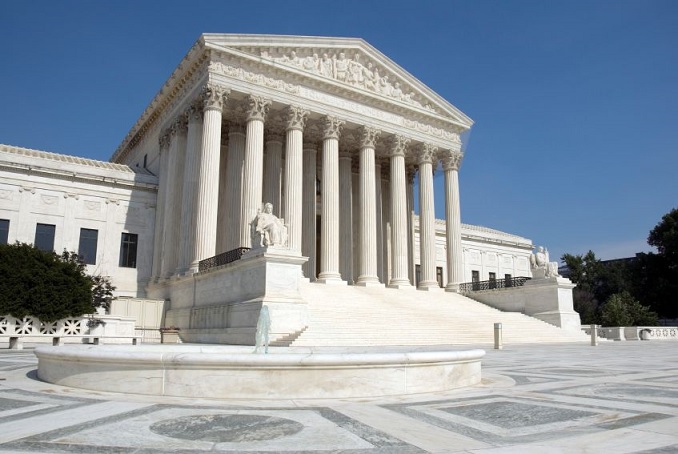
In order to establish what the law meant by “debt collector,” the justices sparred with counsel for much of the argument over the similarities between a law firm seeking to foreclose on a property and a repossession agent, or repo man, who arrives in the “dead of night.”
Washington DC – 7 January 2019 – The Supreme Court is attempting to resolve a legal question that could have broad ramifications on hundreds of thousands of Americans who are foreclosed on without a judicial process each year. A key issue in the matter is who or what can be considered a “debt collector.”
The justices were divided, but not into clear ideological zones. Chief Justice John Roberts and Justice Brett Kavanaugh, Republican-appointed conservatives who are typically business friendly, were among the most skeptical questioners of the respondent in the case, a law firm working on behalf of Wells Fargo.
To be sure, there are ideological divides at issue. Sen. Elizabeth Warren, D-Mass., who announced a formal step toward a bid for the presidency last month, took a public stance on behalf of the petitioner in the case.
Warren, alongside potential 2020 contender Sen. Sherrod Brown, D-Ohio; Rep. Maxine Waters, D-Calif.; and a slate of other liberal lawmakers, filed a brief outlining what they believed was Congress’s intent in drafting the law at issue.
On the other side was the Trump administration, which dispatched the solicitor general, as well as powerful business interests including the Chamber of Commerce and associations representing bankers.
The case centers on Dennis Obduskey, a Colorado man who defaulted on his $329,940 home loan in the aftermath of the 2007 financial crisis. The question in the case is whether Obduskey is entitled to legal protections for debtors provided by Congress in 1977, or whether the foreclosure is exempt because it is Obduskey’s home, and not money, that is at stake.
Obduskey obtained his home loan from a company called the Magnus Financial Corporation in 2007. Like many other Americans, he defaulted on the loan in 2009.
The bank then attempted to foreclose on Obduskey for six years, to no avail. Finally, in 2015, Wells Fargo retained a law firm — McCarthy & Holthus — to handle the foreclosure proceedings. But, as of the latest briefs in the case, Obduskey’s home has yet to be sold.
The question of whether a law firm seeking to foreclose on a property is a debt collector is one that could affect millions of Americans. In 2016, about 200,000 homes were lost to foreclosure in states that permit lenders to foreclose on a property without going to court. Business groups have argued that these so-called non-judicial foreclosures are more efficient and fair to borrowers. Progressives say borrowers are entitled to more protections.
Obduskey’s attorney, Daniel Geyser, argued that McCarthy & Holthus is a debt collector and therefore required to comply with certain procedural protections contained in the 1977 Fair Debt Collection Practices Act. That law was passed to prevent debt collectors from engaging in abusive or predatory practices.
But Kannok Shanmugam, the attorney for the respondent in the case, argued that the FDCPA does not apply because, he said, the firm is not a debt collector. Shanmugam argued that Congress has long made a distinction between those collecting debts and those who seek to enforce security interests, or collect property that is owed without demanding payment.
The court is expected to issue a ruling by late June and the Justices appear to be split in opinion.
The fight seemed to split the justices into their unusual camps, with Roberts at one point remarking to Shanmugam that the law is “not the way you would have told Congress how to write the statute.” Neither was it the way “your friend on the other side” would want Congress to write it, he added, referring to Geyser.
Kavanaugh suggested that he believed the firm was a debt collector. The purpose of a foreclosure, he said, is telling somebody “you need to pay or you’ll lose your house.”
Roberts added that “it certainly is an indirect effort to collect the debt,” which led Shanmugan to concede that Roberts’ point “makes it harder for me,” before he pointed to what he said was a longstanding distinction between debt collectors and those seeking to enforce security interests. It would not make any sense for Congress to distinguish between the two groups if someone enforcing a security interest is a debt collector, he said.
Importantly, the meaning of “debt collector” under the law does not necessarily have to hew to what it means in common speech. Indeed, McCarthy & Holthus itself sent Obduskey a notice identifying itself as a debt collector and requesting payment, which a federal appeals court said was not enough to invoke the FDCPA.
In order to establish what the law meant by “debt collector,” the justices sparred with counsel for much of the argument over the similarities between a law firm seeking to foreclose on a property and a repossession agent, or repo man, who arrives in the “dead of night.”
Importantly, the meaning of “debt collector” under the law does not necessarily have to hew to what it means in common speech. Indeed, McCarthy & Holthus itself sent Obduskey a notice identifying itself as a debt collector and requesting payment, which a federal appeals court said was not enough to invoke the FDCPA.
In order to establish what the law meant by “debt collector,” the justices sparred with counsel for much of the argument over the similarities between a law firm seeking to foreclose on a property and a repossession agent, or repo man, who arrives in the “dead of night.”
Justice Sonia Sotomayor, however, appeared to agree with Geyser’s argument that the firm could be both, and noted that “what’s really at issue is the unfair practices.”
The justices were missing Ruth Bader Ginsburg, who did not attend oral arguments for the first time in more than 25 years on the bench.
The federal appeals courts are divided on the issue. At least two federal appeals courts have reasoned that “debt is synonymous with money” and so the FDCPA therefore would not apply to a law firm that is seeking to collect property.
The district court dismissed Obduskey’s complaint on those grounds, and that decision was ultimately affirmed by the U.S. 10th Circuit Court of Appeals.
At least three other federal circuits have staked out a different interpretation of the law. For instance, the 6th U.S. Circuit Court of Appeals has held that every mortgage foreclosure is undertaken “for the very purpose of obtaining payment on the underlying debt.”
The court, in the 2013 case Glazer v. Chase Home Finance, held that there “can be no serious doubt that the ultimate purpose of foreclosure is the payment of money.”
In a brief, an array of business groups including the Chamber of Commerce and the Mortgage Bankers Association wrote that applying the FDCPA protections to the foreclosure process would add “an additional, unwarranted layer of complexity in the foreclosure process, thereby harming both lenders and borrowers.”
It was not clear on Monday which side would be able to secure the five votes necessary to win. Making any inferences harder was the absence of Ginsburg, who is expected to vote in the case but who was not able to ask any questions of counsel.
Source: CNBC










